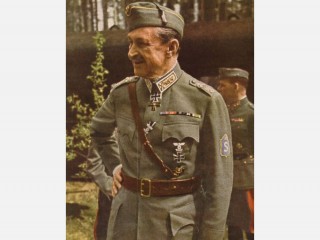
Carl Gustav Von Mannerheim biography
Date of birth : 1867-06-04
Date of death : 1951-01-27
Birthplace : Askainen, Russian Empire
Nationality : Finnish
Category : Politics
Last modified : 2011-01-05
Credited as : Military leader, and statesman,
The Finnish military leader and statesman Baron Carl Gustav Emil von Mannerheim was the father of modern Finland.
Carl Gustav von Mannerheim was born on June 4, 1867, near Turku of a prominent family. He received his early military training in imperial Russia and early showed courage and adaptability to the vigorous life. He explored Central Africa, served in the Russo-Japanese War, and was commander of Russia's VI Cavalry Corps on the Romanian front in World War I. With Russia's collapse he returned to a Finland in turmoil.
On Jan. 4, 1918, the president of the Finnish Senate had received from the Soviets recognition of Finnish independence in a document signed by Stalin, Trotsky, and Lenin. On January 28, however, the Red Guards, dominated by Finnish left-wing Social Democrats, seized power in most of the major cities. Members of the government, the Whites, made up of leading members of the government and those who believed in parliamentary democracy, gathered at Vaasa, where they offered the seasoned Mannerheim command of their army.
Mannerheim's first task was to disarm the more than 40,000 Russian soldiers still on Finnish soil to prevent them from joining the rebel forces, who already outnumbered his own. His initial objective achieved, he trained his forces and struck against the overmanned and underofficered Red strongholds at Helsinki, Viipuri, and Tampere. In the interim he tried without success to prevent the Germans from entering the struggle as allies. With unneeded German aid the Reds were defeated, and by the middle of the summer the Red bloodbath had been followed by a White one. Mannerheim meanwhile labored to erect a republic of Finland free of German and Soviet ties. Although he cooperated in the Allied attack on the Soviets, his chief concerns in 1918, as later in the 1940s, were Finnish independence and national security. On May 16, 1918, he resigned as commander in chief because of the pro-German policy of the government, and on December 12 he became chief executive of Finland. On the first election under the new constitution, however, he was defeated by Professor Kaarlo J. Sta°hlberg and left office in July 1919.
Mannerheim realized that Finland had to live amicably with the Soviets, but he also knew that the Russians understood strength. Consequently, as defense minister, he built a series of fortifications known as the Mannerheim Line, which stood Finland in good stead in November 1941, when the Soviet Union, after gobbling up part of Poland and the Baltic Provinces, invaded Finland by land, sea, and air without declaring war.
At the age of 72 Mannerheim was called back as commander in chief and successfully guided Finnish defenses during the Winter War, which ended in March 1940. The relatively favorable peace settlement was violated by the Soviet Union in June 1941, and Mannerheim remained as commander in chief until peace was negotiated in August 1944. In June 1942 he was named the only marshal in Finnish history and became president of the republic in 1944. He soon retired because of ill health and died in Lausanne, Switzerland, on Jan. 27, 1951. Controversial though he was, the bulk of the Finnish people sincerely mourned his passing.
The best account for details is Mannerheim's Memoirs, translated by Count Eric Lewenhaupt (1954). Perhaps the best-balanced interpretation is Anatole G. Mazour, Finland between East and West (1956). Also worth consulting are Tancred Borenius, Field-Marshall Mannerheim (1940), and John H. Wuorinen, A History of Finland (1965).
















